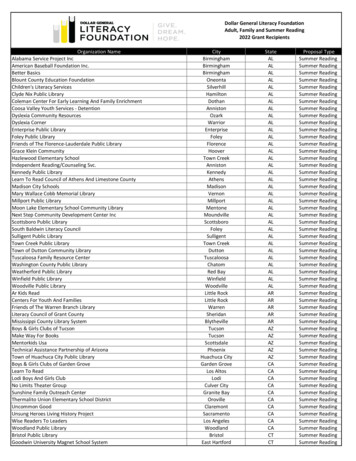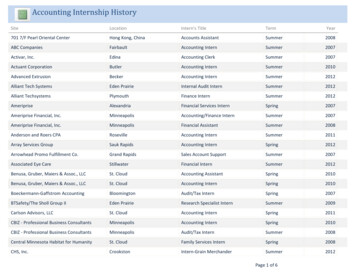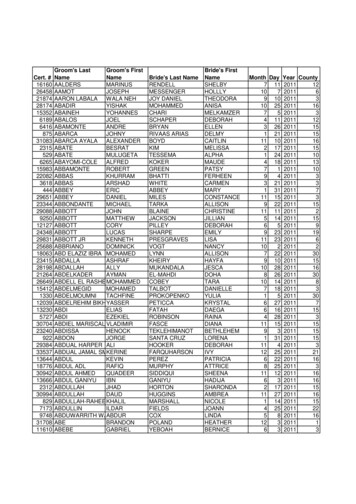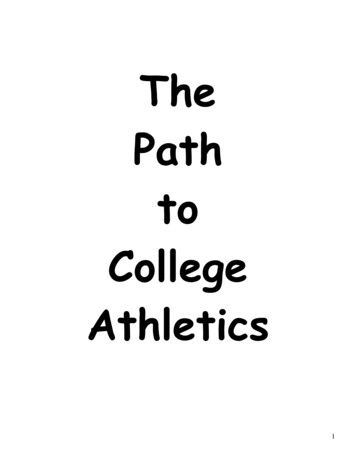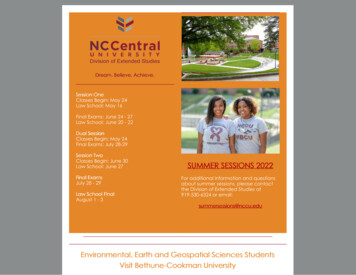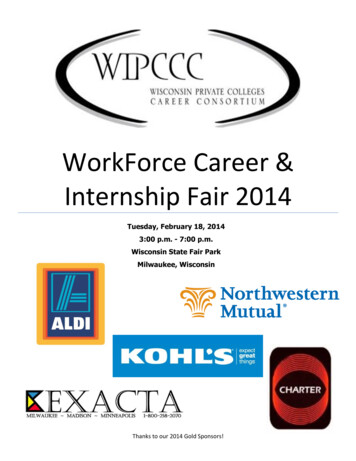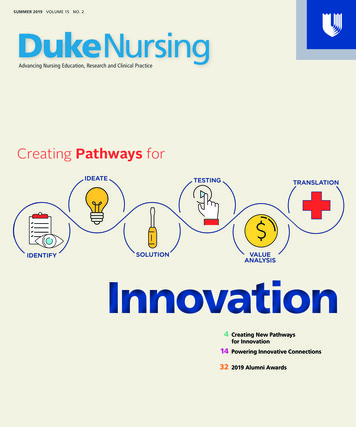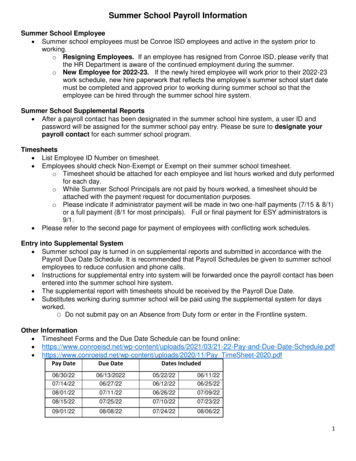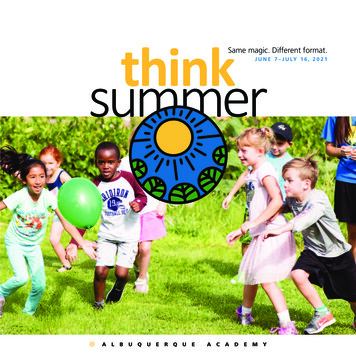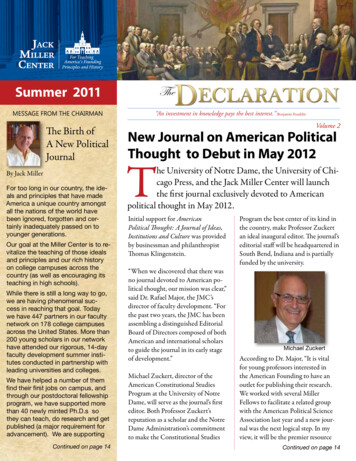
Transcription
Summer 2011MESSAGE FROM THE CHAIRMANThe Birth ofA New PoliticalJournalBy Jack MillerFor too long in our country, the ideals and principles that have madeAmerica a unique country amongstall the nations of the world havebeen ignored, forgotten and certainly inadequately passed on toyounger generations.Our goal at the Miller Center is to revitalize the teaching of those idealsand principles and our rich historyon college campuses across thecountry (as well as encouraging itsteaching in high schools).While there is still a long way to go,we are having phenomenal success in reaching that goal. Todaywe have 447 partners in our facultynetwork on 178 college campusesacross the United States. More than200 young scholars in our networkhave attended our rigorous, 14-dayfaculty development summer institutes conducted in partnership withleading universities and colleges.We have helped a number of themfind their first jobs on campus, andthrough our postdoctoral fellowshipprogram, we have supported morethan 40 newly minted Ph.D.s sothey can teach, do research and getpublished (a major requirement foradvancement). We are supporting1Continued on page 14“An investment in knowledge pays the best interest.” Benjamin FranklinVolume 2New Journal on American PoliticalThought to Debut in May 2012The University of Notre Dame, the University of Chicago Press, and the Jack Miller Center will launchthe first journal exclusively devoted to Americanpolitical thought in May 2012.Initial support for AmericanPolitical Thought: A Journal of Ideas,Institutions and Culture was providedby businessman and philanthropistThomas Klingenstein.“When we discovered that there wasno journal devoted to American political thought, our mission was clear,”said Dr. Rafael Major, the JMC’sdirector of faculty development. “Forthe past two years, the JMC has beenassembling a distinguished EditorialBoard of Directors composed of bothAmerican and international scholarsto guide the journal in its early stageof development.”Michael Zuckert, director of theAmerican Constitutional StudiesProgram at the University of NotreDame, will serve as the journal’s firsteditor. Both Professor Zuckert’sreputation as a scholar and the NotreDame Administration’s commitmentto make the Constitutional StudiesProgram the best center of its kind inthe country, make Professor Zuckertan ideal inaugural editor. The journal’seditorial staff will be headquartered inSouth Bend, Indiana and is partiallyfunded by the university.Michael ZuckertAccording to Dr. Major, “It is vitalfor young professors interested inthe American Founding to have anoutlet for publishing their research.We worked with several MillerFellows to facilitate a related groupwith the American Political ScienceAssociation last year and a new journal was the next logical step. In myview, it will be the premier resourceContinued on page 14
Constitution Day Initiative Steering GroupLeading Scholars and JMC LaunchConstitution Day InitiativeLead Gift Provided by the Andrea Waitt CarltonFamily FoundationThe JMC in partnership with leading universities and colleges across the United States haslaunched a new Constitution Day Initiativeto heighten awareness of the need for education in theAmerican constitutional tradition.Prominent scholars who lead highlyregarded academic centers dedicated to strengthening education inAmerican history and politics willguide this effort, (see adjacent page)which aims to increase attentionto teaching and studying America’sConstitution.JMC President, Rear Admiral MikeRatliff, praised these educators forfocusing attention on the “essentialtask of every generation of Americancitizens, understanding our constitution and the founder’s vision for ourpolitical and economic life. SenatorRobert Byrd showed great foresightin mandating that our colleges anduniversities focus attention on thisessential task each year as part of theirobservance of Constitution Day, andthe distinguished scholars who havetaken up this task should give all of ushope for our nation’s future.”Foundation (Nashville, TN) has provided a lead gift for the ConstitutionDay Initiative. This project willbe an ongoing, national effort todeepen Americans’ knowledge andappreciation of the Constitutionwhich is celebrated annually onSeptember 17. The theme for 2011 is“The Limits of Federal GovernmentAction in Domestic Affairs under theConstitution.”JMC Network in ActionThe Andrea Waitt Carlton Family“With a network of over 400 JMCFellows, many of whom specialize specifically in the study and teaching ofthe American constitutional tradition,and with partner programs on 44 college and university campuses, the JackMiller Center is ideally suited to takeup the cause of building awareness ofConstitution Day and having a majornational impact on how it is observedon college and university campusesas well as in many communities2The Jack Miller Center Summer 2011across the country,” said Bill McClay,professor of history, University ofTennessee-Chattanooga, who proposed the project at the JMC’s boardmeeting in February.The core of the Constitution DayInitiative will be programming onindividual campuses nationwide.Scholars from across the country havebeen invited to submit proposals tofund Constitution Day events on theircampuses. The Jack Miller Center willaward up to 2,000 in support foreach campus. Special considerationwill be given to proposals that includematching funds from scholars’ collegesor universities.The JMC encourages a variety ofefforts that will build awareness andunderstanding of the Constitutionand the free institutions and libertiesit guarantees. These events could rangefrom a small ‘brown bag’ lunch discussion for students to a larger publicJames CeaserDaniel Hays LowensteinBarry StraussOne of America’s most influentialpolitical theorists and a respectedexpert on the presidency. Ceaseris the Harry F. Byrd Professorof Politics at the University ofVirginia, where he also directsthe Program on Constitutionalismand Democracy.Professor of Law Emeritus at theUniversity of California at LosAngeles and a nationally respected specialist in election law.He is director of the new UCLACenter for the Liberal Arts andFree Institutions.Chairman of the Department ofHistory at Cornell University andfounding director of the Programon Freedom and Free Societies.Daniel CullenProfessor of Political Science atRhodes College in Tennessee,where he is director of the Projectfor the Study of Liberal Democracy.Robert FaulknerProfessor of Political Science,past chair of the Boston CollegeDepartment of Political Science,and past president of the NewEngland Political Science Association.Thomas PangleJoe R. Long Professor In Democratic Studies at the Universityof Texas at Austin, and the codirector of the Jefferson Center.His books include volumes onMontesquieu and Leo Strauss,as well as studies such as TheSpirit of Modern Republicanism:The Moral Vision of the AmericanFounders and the Philosophy ofLocke.reception or educational lecture.In addition, the JMC also envisions an online educational portalfor educators and others interestedin constitutional issues, as well as acapstone event in Chicago for thegeneral public. The JMC’s ChicagoInitiative is a unique consortium ofseveral Chicago area colleges that areWilfred M. McClaySunTrust Bank Chair of Excellence in Humanities at the University of Tennessee at Chattanooga, and Senior Scholar atthe Woodrow Wilson InternationalCenter for Scholars and since2002. He has served as a member of the National Council onthe Humanities and the advisoryboard for the National Endowment for the Humanities.Michael MungerProfessor of Political Science atDuke University, and directorof the Duke Philosophy, Politics,and Economics Program.working together to enrich educationin America’s Founding Principles andhistory.In 2004 Congress passed legislationrequiring that every institution ofhigher education receiving federalfunds must hold educational programming on September 17 in observanceThe Jack Miller Center Summer 2011Bernhardt TroutProfessor of Chemical Engineering at the Massachusetts Institute of Technology, and directorof the Novartis-MIT Center forContinuous Manufacturing aswell as the Benjamin FranklinProject.Michael ZuckertNancy Dreux Professor at theUniversity of Notre Dame andpast chairman of the department of Political Science. Hedirects the Constitutional Studies Program, and is editor of theforthcoming Journal ofAmerican PoliticalThought.of Constitution Day. The observationof this holiday on campuses since thislegislation passed has been minimal atbest. Through this initiative, the JMChopes to have a significant impact onhow Constitution Day is observed oncampuses and in communities acrossthe nation.3
Partner Programs in ActionLecture Series at UCLA Commemorates 150thAnniversary of the Civil WarFirst Lecture in Five-Year Series Features Pulitzer Prize Winner Daniel Walker HoweDaniel Lowenstein, Professorof Law Emeritus at UCLA,directs the new UCLA Centerfor the Liberal Arts and FreeInstitutions.To commemorate the 150thanniversary of the Civil War,the Center for the LiberalArts and Free Institutionsat UCLA (CLAFI) willlaunch a five-year lectureseries beginning in fall 2011.The JMC is a supporter ofCLAFI, which will host theJMC’s Faculty DevelopmentSummer Institute in Pasadenathis August.Each year, at least twolectures will be presented centering on events from the corresponding year of the Civil War. One lecture each year isexpected to center on military events, while the other maydeal with political, economic, diplomatic, or other developments during the year in question.Daniel Walker Howe, emeritus professor at UCLA andOxford University and Pulitzer-prize winner for hisWhat Hath God Wrought: The Transformation of America,1815-1845, will deliver the first lecture of the series inOctober 2011. Professor Ethan Rafuse of the US ArmyCommand General College will deliver the second lectureon November 10.Lecturers in future years will include luminaries such asJames M. McPherson, Professor Emeritus at PrincetonUniversity and Pulitzer-prize winner for Battle Cry ofFreedom: The Civil War Era, and Professor Allan Guelzoof Gettysburg College, a leading scholar and biographer ofAbraham Lincoln.Consistent with CLAFI’s usual practice, in addition to their4formal lectures, each visitor will have the opportunity tointeract more intimately with a group of up to twenty students, faculty members, and others in a two-hour seminaron writings selected by the visitor. In the Civil War series,these could include speeches of Lincoln or other leaders ofthe Union or the Confederacy, contemporary letters anddiaries, excerpts from the memoirs of participants suchas Grant or Sherman, or even works of fiction about theperiod.CLAFI was created as an interdisciplinary center within theUCLA Division of Humanities in 2009. The program provides a home on campus for students and faculty who shareCLAFI’s principles that educated citizens should have asound understanding of the history of free institutions andtheir underlying principles, and that a central purpose of auniversity is to encourage students and faculty to confrontbasic questions of human existence and society, drawingespecially on great works and achievements of WesternCivilization.CLAFI’s inaugural public event, a four-day bicentennial celebration of Lincoln, was held in November 2009.Professors Howe and Gulezo both spoke at the inauguralevent. CLAFI sponsored another public event in the springof 2010, “Mark Twain on the Page and on the Stage.” Inthe current academic year, CLAFI has sponsored a seriesof six lectures on varied subjects, such as Shakespeare’splays, Samuel Johnson’s politics, and Jewish influenceon Enlightenment political thought. CLAFI also offersUCLA students a small but growing selection of courses onpolitical philosophy and literature.The Jack Miller Center Summer 2011JMC, Bradley Foundation Fellows Gather for 25thAnniversary Celebration of Bradley FellowshipsMore than 100scholars andguests participated in a two-day conferenceconducted by the JMC andthe Lynde and Harry Bradley Foundation on April14-15 in Chicago.The conference, Liberal Democracy andLiberal Education, celebrated the 25thanniversary of the Bradley Foundation’sgraduate and post-graduate fellowshipprogram, and highlighted the contributions of some of the most distinguishedalumni of the program. For 25 years, theBradley Program has offered the nextgeneration of scholars the opportunity topursue serious studies, conduct research,and enhance their competitiveness on thejob market.Presenters on the roundtable on “Liberal Education and American Society”, fromleft: Hillel Fradkin (Hudson Institute), John Agresto (American University of IraqSulaimani), Donald Downs, (University of Wisconsin), and Kathy Eden (ColumbiaUniversity).The program included panels on “CivicResponsibility and Higher Education,”“Liberal Education, Civic Responsibility and Patriotism,” and “Civic Education and Economic Liberty” as well as aroundtable on “Liberal Education andAmerican Society.” Speakers includeddistinguished scholarssuch as Robert P. George(Princeton University),James Ceaser (University of Virginia), WalterMcDougall (Universityof Pennsylvania), AlanCharles Kors (University of Pennsylvania), andKathy Eden (ColumbiaUniversity).Professor Donald Downs of the University of Wisconsindelivers his comments on liberal education.“The 25th AnniversaryCelebration was a glowingsuccess. It was a gratifying experience for me toThe Jack Miller Center Summer 2011work with the Jack Miller Center, and Ilook forward to future opportunities forthe two organizations to work together,”said Dianne Sehler, director of academic,international, and cultural programs atthe Bradley Foundation.Professor Robert George of PrincetonUniversity delivered the opening dinner talk, “Liberal Education: What’s thePoint?” Michael Barone, senior politicalanalyst for the Washington Examiner,closed the event with a post-dinner talkon contemporary politics.The Lynde and HarryBRADLEY FOUNDATION5
Suggested ReadingsCivic Education Initiative to Launch in SeptemberContemporary Literature ExploringAmerica’s Founding and HistoryThe Idea of America: Reflections on the BirthOf the United Statesthe experience of foreign travel, it canrefresh the mind and provide a sense ofdistance from the familiar. How sad it is,therefore, that so much academic historytoday does just the opposite, projectingcurrent issues back onto the past, invariably for the purpose of promoting a contemporary ideological viewpoint. Insteadof freeing us from the present, “history” ofthis kind ends by imprisoning the past.”Three Flags by Jasper Johns. 1958.By Gordon S. WoodPenguin PressGordon Wood’s, new book, “The Idea ofAmerica: Reflections on the Birth of theUnited States,” was reviewed in The WallStreet Journal (The Visionary Generation,p. C7, May 14-15, 2011). Professor Woodis a member of the JMC’s Academic Advisory Council, and a frequent lecturer atthe JMC’s faculty development summerinstitutes.The review was written by James Ceaser,professor of politics at the Universityof Virginia, and chairman of the JMC’sAcademic Advisory Council. In hisreview Jim commends Professor Wood forhis refusal, unlike so many of his fellowhistorians, to politicize history.Fortunately, there are still historians whodeplore, to borrow Gordon Wood’s unvarnished language, the “gross presentismof much current history writing” and the“effort to use history as an ideologicalweapon in contemporary politics.” AndMr. Wood certainly has reason to complain, for it is in his field of inquiry—theperiod of the Revolution and early republic—that the politicization of history hasgone furthest.“The Idea of America” consists of 11 essays on different aspects of the Foundingthat are drawn from the full span of Mr.Wood’s career, to which he has added asubstantial introduction and conclusion.All of the essays have been updated or reconfigured, with an afterword appendedto each. What the book may sacrifice inoverall unity it more than makes up forin the richness of its reflections on thecharacter and import of the Founding. Itis Mr. Wood’s most “personal” work, providing us, along with much fine history,glimpses into the thinker and the man.“Mr. Wood is our premierstudent of the Founding Era.”Reading history allows one to escape theblindfolds and categories of our day andenter into another time, when peoplethought and acted in different ways. LikeMr. Wood is our premier student of theFounding Era. He has been writing history for about a half-century, roughly afifth of the days since the origin of therepublic. He has scrupulously avoidedappropriating his subject for modern-daypolitical purposes and instead tried tounderstand it on its own terms and as awhole. Historians will of course bring totheir study certain questions and concernsof their own time—no one can or shouldavoid this—but the greatest historiansare those, like Mr. Wood, who do not6The Jack Miller Center Summer 2011The following is reprinted with permission of The Wall Street Journal:make our criteria of importance the maintheme.Gordon WoodDid You Know?A portion of book sale revenues fromAmazon.com are contributed to theJMC as long as Amazon.com is reachedthrough links in the JMC Book Store.An ambitious new effort to reform civic education inthe United States will be launched in Septemberwith the publication of Teaching America: The Casefor Civic Education, a collection of essays by leading advocates of improving education in American history and government.The Civic Education Initiative is led byDavid Feith, an op-ed editor at The WallStreet Journal, and Jordan Hirsch, an editor at Foreign Affairs magazine. Both arerecent graduates of Columbia Universityin New York.“I co-founded this project in 2009, whilea student at Columbia University, afterlearning that not even twenty-five percentof American students are proficient incivics and U.S. history, the subjects meantto prepare us to be responsible citizens,”said Feith. “Almost sixty percent ofhigh-school seniors can’t identify the halfcentury when the Civil War occurred, orrecognize basic symbols of the civil rightsmovement.”The essays in Teaching America willhighlight the dangers of civic ignoranceand launch a nationwide campaign forreform. Contributors include JusticeSandra Day O’Connor, former EducationSecretary Rod Paige, Senator Jon Kyl, former Senator Bob Graham, Harvard Lawprofessor Alan Dershowitz, journalistJuan Williams, historian Michael Kazin,political blogger Glenn Reynolds, andcharter-school leaders Mike Feinberg andSeth Andrew.The book’s contributors also include JackMiller Center President Mike Ratliff,as well as Bruce Cole, the president ofthe American Revolution Center and amember of the JMC’s board of directors,and Emory University Professor and JMCFellow Mark Bauerlein.“The Civic Education Initiative intendsto drive a nationwide reform agenda. Itsguiding principle is that the next generation of Americans needs to understandand appreciate our country’s history,institutions and political process,” saidRatliff. “The Jack Miller Center sharesthis principle, which is central to preserving our constitutional system and the freeand open nature of our society.”“Almost sixty percent of highschool seniors can’t identifythe half-century when theCivil War occurred, orrecognize basic symbols of thecivil rights movement.”literacy nationwide. They will adapt theiressays in newspaper op-eds and speakat schools, universities and other publicforums. The Civic Education Initiativewill also distribute Teaching America tomembers of Congress, state superintendents of education, and leading educationreformers.Challenge 2026“The second phase of our work will beginnext year with Challenge 2026. Theyear 2026 is the 250th anniversary of theFounding of the United States, and it isexactly one generation of students, kindergarten through 12th grade, away fromtoday. Hence our challenge: By 2026,every high school graduate should be ableto pass the citizenship exam,” said Feith.To help reach that goal, the CivicEducation Initiative will begin by advancing the reforms laid out in TeachingAmerica. Starting next year, it will thenlaunch several additional efforts—forexample, a Civic Ambassadors Program topair authors (and other advocates) withschools in their communities.According to Feith, Teaching America is“part history book, part battle cry, andpart toolkit for policymakers, educatorsand philanthropists. The crisis in civicliteracy needs to be front and center ofa national discussion. With TeachingAmerica we intend to flag this problemfor a broader audience. It’s long overdue,and we’re proud to have produced it.”Obviously, this ambitious project needsthe support of like minded organizationsand financial resources to fund the manyactivities now in development. “We arealready privileged to be working withleaders such as Admiral Ratliff, JusticeSandra Day O’Connor, Senator Jon Kyland the other contributors to TeachingAmerica,” said Feith. “With the help ofmany other concerned Americans wecan make these partnerships all the morefruitful.”Following the book’s release, its contributing authors will spearhead a broad publiccampaign to raise awareness of civic il-Editor’s Note: To learn more about theCivic Education Initiative, please contactDavid Feith at david.feith@wsj.com.The Jack Miller Center Summer 20117
A Scholar’s ViewBy Professor Roosevelt MontasColumbia UniversityAssimilation and CitizenshipAssimilation is an ugly word. In the TV series StarTrek, it is what the Borg—a predatory cyberneticcollective—want to do to humans, as they have doneto countless other species.Even before one wonders about the assimilating body, the idea of assimilationsuggests the loss of identity, of selfhood, and of what makes one unique. It is nowonder that the idea of “assimilation” can be a non-starter when one wants toengage with people outside the cultural and political mainstream about ways ofhaving their voices heard and about ways of being, properly speaking, citizens.“Integration” is perhaps a more palatable term, implying a kind of mutual accommodation and collaborative alliance. The nomenclature can distract from theissue that actually matters: assimilation is not about diluting personal identity,but about qualifying for political agency.“. assimilation isnot about dilutingpersonal identity, butabout qualifying forpolitical agency.”I prefer to describe the process of assuming civic agency simply as “education.”Etymologically, the word “education” stems from the Latin word for “rearing” or“bringing up.” The root verb, to “educe,” points to a process of “calling forth” orof “drawing out” a latent quality. In a multicultural and democratic society, theprocess of assimilation is best conceived of in terms of education; in terms of thedrawing out of latent potentialities. Assimilation, in this sense, does not denotecultural dilution, but rather the attainment of an enfranchised status within aparticipatory venture.As Aristotle pointed out long ago, we are, by nature, political animals—creaturesof the city who live, work, and find meaning in voluntary collaborations. Toeducate is to nurture an individual into such a collaborative community, into abody politic—the optimal context in which an individual can unfold his or herfull human potential. The process of education is, ultimately, this process ofcitizen-making: it is the process of rearing into a community as a member withthe standing to speak and be heard; with the status of a political agent.This mechanism of education-as-assimilation—not assimilation of knowledgeinto oneself, but assimilation of oneself into a larger social collective—is indis-8The Jack Miller Center Summer 2011pensable for the functioning of any democratic society, but especially for a societylike America.Indeed, the constellation of ideas I am invoking has a particular American resonance. Consider the salience of three characteristics of the American nationalexperiment: 1) the near universality of the immigrant experience, 2) the ubiquityof literacy among its founding generation, and 3) its character as a multi-ethnicand multi-racial society from the very beginning. These defining features ofthe national project delineate the centrality of education-as-assimilation in theAmerican context.It was the great African American intellectual, W.E.B. Du Bois, who noted, whenreflecting on the value of the liberal arts in black colleges, “I sit with Shakespeare,and he winces not, across the color-line I move arm in arm with Balzac andDumas.” Du Bois saw education as the essential pathway to a life of dignityeven in the face of racial discrimination. In his struggle to open a space in theAmerican landscape for fully-fledged black citizenship, he sounded not the toneof assimilation, but the clarion call of liberal education and the empowered socialagency it makes possible.“The process ofeducation is,ultimately, thisprocess of citizenmaking.”Today, as America faces historic demographic challenges both from immigrationand from internal economic and ideological polarizations, the central place ofeducation in our national life must be re-emphasized and re-invigorated.Roosevelt Montas is a professor at ColumbiaUniversity and the director of Columbia’s Center forthe Core Curriculum. He specializes in AntebellumAmerican literature and culture, with a specificinterest in citizenship and American national identity.The Jack Miller Center Summer 20119
JMC Welcomes New Members to Academic Advisory CouncilAdvancing CareersTMiller Fellow Accepts Tenure TrackPosition at Wofford CollegeMiller Fellow Kathryn Milne will begina tenure-track position at WoffordCollege (South Carolina) this fall. Milneis currently a JMC/Veritas PostdoctoralFellow at Cornell University where sheteaches classes on ancient and militaryhistory. The ancient texts of Greece andRome heavily influenced the FoundingFathers in their debates as they formedthe Republic. She received a Ph.D. inAncient History from the University ofPennsylvania.Q: How did the postdoctoral fellowshipat Cornell prepare you for the next step inyour career?A: Researching and teaching at Cornellhas been an amazing experience, and ithas been my privilege this year to be apart of such a vibrant and inspiring intellectual community. I am very gratefulto have been given the opportunity tomake great progress on my book manuscript and am happy that I will be able tostart on the tenure track already poisedto bring that project to fruition. As I continue to teach, I know that the experienceI gained in the classroom at Cornell willhelp me to become a more effective mem-he JMC Academic Advisory Council is comprised of 24 of the nation’s leading scholars in history, government, economics, law, literature, and political thought. Beloware nine recent additions to the council, which advises the JMC regarding a variety ofacademic initiatives:ber of Wofford’s vibrant, student-focusedfaculty.Q: How did the relationships you built atCornell, with both mentors and students,influence your scholarship and teaching?A: I was extremely lucky to be a part of areading group in military history made upof both faculty and students, where I wasable to discuss my research ideas and takefeedback on my book manuscript. Beingable to air my thoughts to knowledgeable people with different backgroundsand expertise really helped me to makemy research well-rounded. Watchingthe veteran professors here teach has alsobeen a lesson in itself. I had Dr. BarryStrauss, our department chair, do a guestlecture in my class and I really felt quiteschooled! In regard to teaching, mystudents used their knowledge of militaryscience, psychology, and other subjects tobring some remarkable insights into theclassroom, and I’m proud to say I learneda lot from them.Q: How do you hope to have an impacton Wofford’s campus?Kathryn MilneA: My position at Wofford representspart of their expansion into new subjectareas, and I’m excited that my teachingwill bring the study of ancient historyonto campus for the first time. I hopethat I can inspire student interest in theancient world and especially what I consider my two specialty topics, leadershipand the military.Q: What courses do you plan to teach?A: I am teaching a humanities class onAnthony and Cleopatra which discusses the roles and duties of men andwomen from the ancient world to today,a survey of the history of the ancientMediterranean, and an upper level historyseminar on Republican Rome. I’m alsoexcited about Wofford’s interim semesterwhich allows faculty to lead trips or teacha non-academic subject during the monthof January. I’d love to take my studentsto Rome, or to Scotland, my own nativecountry!The JMC launched its postdoctoral fellowship program in 2008 thanks to a 1,000,000 anonymous gift. The program hasexpanded rapidly as a result of the JMC-Veritas Fund Joint Initiative as well as the support of other donors who have comeforward. The JMC has provided 52 postdoctoral positions, including 22 in the 2010/2011 year. Fellows work closely withmany of the nation’s leading professors in American history and political thought, helping them prepare for a lifetime careerin the classroom. Thus far, ten postdoctoral fellows have secured tenure-track positions.10The Jack Miller Center Summer 2011GregoryCampbellDanielLowensteinPresidentof CarthageCollege.AndrewDelbancoJulianClarence LeviProfessor in theHumanities;Director ofAmericanStudies at Columbia University; andwinner of the 2006 Great TeacherAward from the Society of ColumbiaGraduates.JakubGrygielGeorge H.W.Bush SeniorAssociateProfessor ofInternationalRelations atJohns Hopkins University; SeniorFellow at the Center for EuropeanPolicy Analysis; and former editor ofthe Journal of Public and InternationalAffairs.Free Institutions.Professor of LawEmeritus UCLAand Di
said Dr. Rafael Major, the JMC's director of faculty development. "For the past two years, the JMC has been assembling a distinguished Editorial Board of Directors composed of both American and international scholars to guide the journal in its early stage of development." Michael Zuckert, director of the American Constitutional Studies

